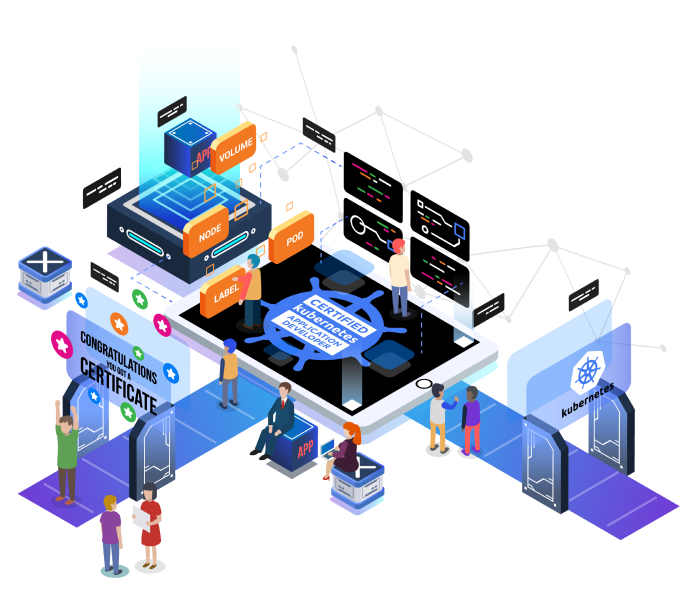Kubernetes Resource Management (en)
Kubernetes Resource Management is an advanced course on Kubernetes that covers a wide range of topics, including Load Balancer, EmptyDir, Dynamic Storage Provisioning, ConfigMaps, Secrets, Ingress Rules, Deployment and DaemonSet Update, Init Containers, Lifecycle Hooks, Resource Requirements, Limit Range, Resource Quota, StatefulSet, Authorization (RBAC), Stout & Sterr, Network Policies, and Kustomize. The course provides practical and theoretical skills for advanced container management in Kubernetes, using recommended tools and best practices.
Requires, as a prerequisite, to have completed DSK101 and DSK102 courses or have equivalent knowledge.
COD: DSK200
Category: Kubernetes

Teaching methodology:
The course includes educational laboratories in which each student will be able to work in order to complete training exercises that will provide practical experience in using the instrument, for each of the topics covered during the course.
Prerequisites:
- Completion of DSK101 and DSK102 courses (or have equivalent knowledge).
- Basic knowledge of Kubernetes and fundamental concepts of container orchestration.
- Familiarity with basic Kubernetes commands and management of pods, deployments, and services.
- Understanding of networking concepts within Kubernetes and storage resources.
- Basic knowledge of security concepts and authentication and authorization tools used in Kubernetes.
- Experience configuring and operating a local Kubernetes development environment or production cluster.
- Knowledge of the main tools and utilities used for Kubernetes administration, such as kubectl and Helm.
The above listed prerequisites ensure that course participants have a solid foundation and basic understanding of Kubernetes and its components. This allows them to take full advantage of the DSK200 course, which focuses on advanced and in-depth topics related to container administration and management in a Kubernetes environment.
At the end of the course the participants will be able to:
- Understand the use of Load Balancer and External Name to allow access to external services from the Kubernetes cluster.
- Become familiar with the use of EmptyDir as a temporary volume within a pod.
- Learn Dynamic Storage Provisioning practices for dynamic storage management.
- Understand Reclaim Policy and proper management of storage volumes.
- Use ConfigMaps to separate application configuration from source code.
- Securely manage sensitive information using Secrets and understand the different types.
- Set up and properly configure Ingress rules for traffic routing.
- Update Deployment and DaemonSet implementations seamlessly.
- Use Init Containers to perform pre-start operations and manage Lifecycle Hooks.
- Define and manage container resource requirements and limits, including Limit Range and Resource Quota.
- Use StatefulSet to reliably manage Stateful applications.
- Implement and manage role-based authorization (RBAC).
- Properly manage stdout and stderr for container log management.
- Understand and apply Network Policies to control network communication between pods.
- Use Kustomize as a tool for managing Kubernetes configurations.
Educational program
Day 1
- Load Balancer and External Name
- EmptyDir
- Dynamic Storage Provisioning
- Reclaim Policy
- ConfigMaps
- Secrets
- Secrets Type
- Ingress Rules
- Deployment Update
- DaemonSet Update
Day 2
- Init Containers
- Lifecycle Hooks
- Resource Requirements, Limits
- Limit Range
- Resource Quota
- StatefulSet
- Authorization (RBAC)
- Stout & Sterr
- Understrand Network Policies
- Kustomize – Trainer Demo
Duration – 2 days
Delivery – in Classroom, On Site, Remote
PC and SW requirements:
- Internet connection
- Web browser, Google Chrome
- Zoom
Language
- Instructor: English
- Workshops: English
- Slides: English
The price of this two-day course is € 1000 + VAT.









